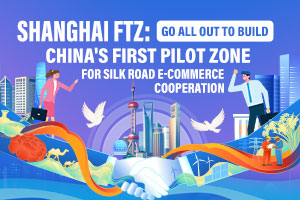MNCs keep the faith in Shanghai as key HQ destination
Shanghai recognized on Monday a new batch of multinational corporations that set up their regional headquarters or research and development centers in the city, a move further cementing its position as the magnet attracting foreign businesses.
A ceremony attended by mayor Gong Zheng certified 30 MNCs' regional headquarters and 10 R&D hubs, with business executives touting China's allure as an investment destination thanks to market vibrancy and favorable policies.
During the first two months of the year, Shanghai saw actual utilization of foreign capital jump 20.3 percent on a yearly basis to $7.78 billion. That was up 25.2 percent over the same period in 2019, before the COVID-19 pandemic hit.
The first four months also saw 20 newly-added MNC regional headquarters and seven R&D centers. With this, the total number of headquarters and R&D hubs in the city rose to 791 and 488, respectively, both of which rank first nationwide.
Zong Ming, vice-mayor, said: "We will continue to unswervingly promote all-around opening-up to support foreign-funded enterprises achieve greater development in Shanghai, through comprehensive empowerment with higher strength, precise services and legal guarantee."
According to the Municipal Commission of Commerce, the latest batch of enterprises are mostly well-known industry pioneers, such as Saudi Arabian chemicals firm SABIC, and ASML from the Netherlands, which manufactures photolithography systems key to the semiconductor industry.
"The strategic position of Shanghai is key to our group's development," said Song Wangqiu, president for the Asia-Pacific region at Metsa Group, a Finnish forest industry group that has chosen Shanghai as its APAC headquarters.
The Asia-Pacific region accounts for a fifth of Metsa's revenue. The company said it has enjoyed double-digit revenue growth in the region in recent years, and its suite of carbon reduction products and solutions are in line with the nation's pledge for greener growth.
Liang Rui, vice-president and head of robotics division in China of Swiss industrial conglomerate ABB, said: "We have been optimistic about the market since we first entered China in 1994. We are actually among the very first foreign companies to introduce both R&D and manufacturing to China. The government policies have always been favorable across all levels. They are particularly helpful in cutting red tape and expediting our process to operate locally and smoothly."
Beverage and snack giant Pepsi-Co Foods sees China as a crucial engine in its global strategy, and the choice of Shanghai as China headquarters marks an important step to fulfill the strategy and navigate the market, said Anne Tse, general manager and senior vice-president of PepsiCo Foods in China.
She applauded the municipality's improving business environment, such as reduced duration needed in getting business licenses, as well as favorable talent policies to allow top-notch candidates to live and work in Shanghai.
Foreign direct investment in actual use in the Chinese mainland rose 39.9 percent on a yearly basis to 302.47 billion yuan in the first quarter, according to the Ministry of Commerce. The volume surpassed the pre-COVID level, rising 24.8 percent from the same period in 2019.


 China's public holidays for 2025
China's public holidays for 2025  Shanghai FTZ: Go all out to build China's first pilot zone for Silk Road E-commerce cooperation
Shanghai FTZ: Go all out to build China's first pilot zone for Silk Road E-commerce cooperation  Favorable policies boost 'China Travel' trend
Favorable policies boost 'China Travel' trend  play
play 